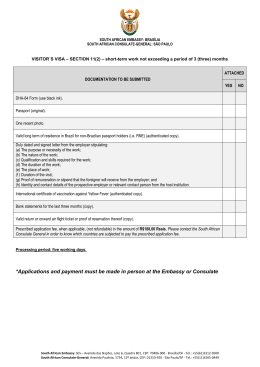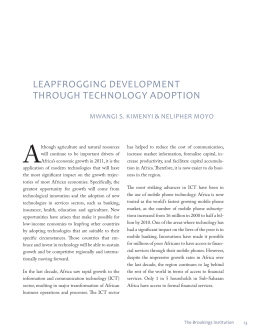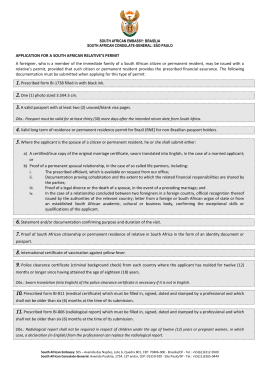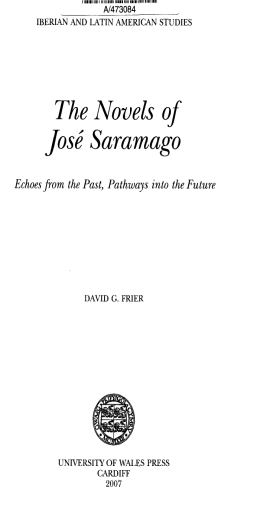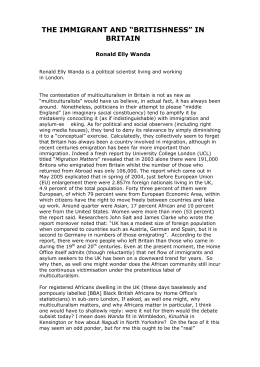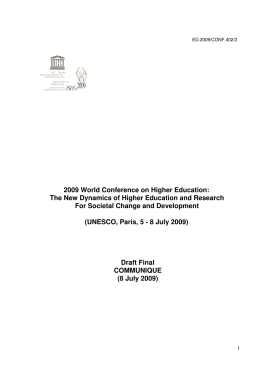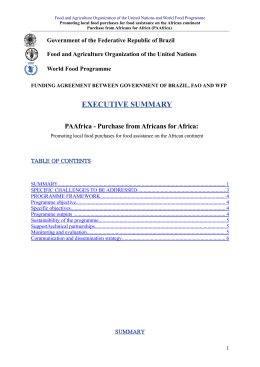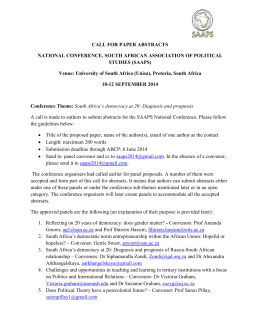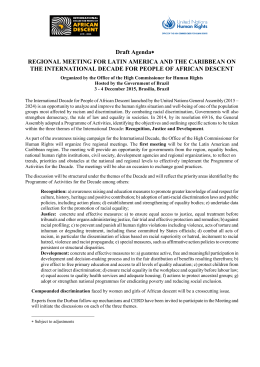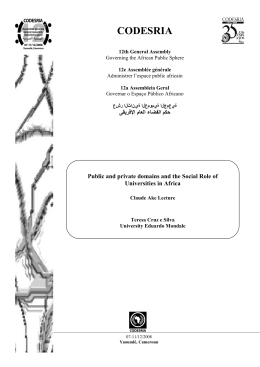The end of a single story? The post-colonial African novel and society Anna Pöysä 2011 Doutoramento em Pós-colonialismos e Cidadania Global Centro de Estudos Sociais/Faculdade de Economia Universidade de Coimbra O Cabo dos Trabalhos: Revista Electrónica dos Programas de Doutoramento do CES/ FEUC/ FLUC/ III, Nº 6, 2011 http://cabodostrabalhos.ces.uc.pt/n6/ensaios.php The end of a single story? This single story of Africa ultimately comes, I think, from Western literature. [...] [W]hen we reject the single story, when we realize that there is never a single story about any place, we regain a kind of paradise. Chimamanda Adichie (2009) 1. Introduction African literature can be seen as questioning the “single story” of Africa created by European colonialism.i I will also discuss the possible social dimension of literature in questioning eurocentrism and neo-liberal globalization and in establishing a situation of cultural plurality. The main question is what kind of social significance postcolonial African literature can have and how this dimension can be included in researching literature. I have chosen to limit the essay to concern only novels, hence leaving out drama, poetry, oral literature and short stories – which obviously can have similar social roles too. I consider that in the novel – which can be considered as an intersection of a European form adapted to African expression – many interesting questions surge, especially relating to the social dimension of literature. However, the influence of literature in the societies it comes from is limited. In many African societies the language situations and other social issues limit the numbers of local readers – reading and buying literature is mainly available for only the most privileged. Regardless of the many obstacles, I consider that African literature can have a significant role, as Frantz Fanon and Amílcar Cabral have underlined. It also has an important role outside the continent, not least because for a long time most people constructed their idea of Africa through colonialist literature, as Adichie refers to in the above quote. -2Anna Pöysä The end of a single story? 2. Novels in Europe and Africa The so-called Western novel has gone through a lot of changes, and hence it is a complex term even when limited to the Western world. As Saariluoma puts it, the novel is seen as a European “invention” which describes the world view of the Europeans and their view of themselves. However, since novels describe changing realities, the novel necessarily changes too (Saariluoma, 1989: 5, 21). What, then, can be defined as a novel? There is no comprehensive definition for a novel, and often novels are defined by different characteristics – depending on the novel in question (Saariluoma, 1989: 11). A novel can be loosely defined as a long, fictional narrative. Further definitions are problematic due to the nature of a novel: it can refer to many kinds of writing. The postmodern novel in particular has broadened the concept. 2.1. The European novel Although Cervantes’ Don Quixote (the first part was published in 1614) or Daniel Defoe’s Robinson Crusoe (1719) are often considered as the first novels, it could be said that the novel becomes established in the 19th century, when also the mass production of newspapers and literature widens. Andrew Milner considers that the birth of the novel is related to print culture – and print-capitalism. Novels (and newspapers) require mechanical mass production, which also makes it possible to write longer prose, which in turn makes the novel “more interiorised and more prosaic than any previous literary form” (Milner 2005: 121-122, 126). The idea of Don Quixote or Robinson Crusoe as the first novels is related to the way they are constructed around an individual. In its earlier phases the novel focuses on individuality, at various levels. First of all, the novel reflects the individualist world view of the bourgeoisie. This reflects on the way the characters are described and on how the structure of the novel is focused on -3Anna Pöysä The end of a single story? the character and her/his personality. The attempt to create psychologically credible, “round” characters is also visible (Saariluoma, 1992: 36-37). Contrary to the novel, it is seen that in epics the characters are described as citizens, or in other words, as members of a community. Milner then, referring to Franco Moretti’s Atlas of the European Novel 1800–1900 (1998), adds that there are also so-called modern epics, which differ from the earlier ones since in these the interest is not in nationstates, but rather on whole continents or on the state of the world. Moretti gives as examples Gabriel García Márquez’s Cien Años de Soledad and James Joyce’s Ulysses (Moretti, 1998 apud Milner, 2005: 133-134). It is also often considered that the African novels focus on nation – characters represent social powers. If in the modernist novel the characters have lost their autonomy, the postmodern novel comes to question the whole role of the main characters in literature. As Saariluoma points out, in the modernist novel the subject was still the force that kept the story together, and this is the main difference from the postmodern novel – which she defines as the post-individualist novel (Saariluoma, 1992: 20). It can also be seen as abandoning the Cartesian world view. On the grounds of these changes the novel has gone through, I consider that regardless of the changes introduced to the “concept” by African writers, the “long, fictional narratives” written by them can be called novels – although Moretti’s suggestion to call texts such as Cien Años de Soledad modern epics could also be extended to many post-colonial African novels. Instead of separating them to represent a totally different genre, by seeing them still as “participants” of the same convention, the reading is more fruitful when considering the relationship between Europe and Africa, and also when considering the social role that literature can have. Although not all novels have a direct social message (while there are no “innocent” novels either), at times novels were considered to have an important social task. If in the 18th century novels mainly served for reinforcing the values and world views of -4Anna Pöysä The end of a single story? the elite, and due to the elitist view on literature itself, it mainly remained within these circles, in the 19th century the novel acquired a new role. As Terry Eagleton suggests, referring to the case of English literature, during the period of romanticism authors were concerned with society, questioning the values of industrial capitalism (1997: 32). In the 20th century, there were ideas (expressed within the academic world by the first professor of English Literature in Oxford, George Gordon) that literature should save England which had become “ill”. Since religion had lost its significance as a unifying force in society, and social reforms were slow, literature should save the souls and heal the state. Hence literature could take the role of offering, spreading and supporting the values that could unite the people. Literature was also seen as a tool for controlling (and civilizing) the working classes and in this way preventing rebellion. Reading would make the lower classes appreciate and respect the achievements of the higher classes (Eagleton, 1997: 36-39). How was literature to affect the readers then? It was considered that since reading is a solitary activity that would make the readers contemplate their lives, it would keep them away from politics, which on the contrary is a collective activity. And if literature was to take on the unifying role that religion had had, Eagleton considers that it also works in the same way as with religion: through emotions and experiences. Because of this dimension, literature serves well for ideological purposes. As Eagleton puts it, the ideologies were not expressed directly, but literature could make people understand and support ideologies by pursuing the reader by literary means. Literature has also another dimension in terms of experiences and emotions. Through reading people have access to experiences that they otherwise would not have. As such it would not be necessary to enhance the situation of the lower classes so that they could have a “richer” life – they could for example satisfy their curiosity towards foreign countries by reading travel literature (Eagleton, 1997: 39-40). Although the successfulness of literature in this specific case -5Anna Pöysä The end of a single story? can be questioned – it did not silence the working classes – it cannot be denied that it can support ideologies by invoking emotions. It could be further suggested that by invoking emotions, literature can play a role in social change or social emancipation – as an example we could consider the literature produced in many African countries supporting the liberation movements. However, this dimension of literature has not been very widely studied, not least since emotions are not considered a valuable topic of study. It can also be argued that reading or researching literature from this perspective alone does not do justice to it. Eagleton refers also to the education that the colonial administrators received. Among other subjects they studied English literature, which reinforced the nationalist feelings of the students, who would then travel to the colonies equipped with national pride and with certainty of the (cultural) superiority of the metropolis (Eagleton, 1997: 42-43). 2.2. The novel in Africa Western-influenced literature emerged at the same time when education became available for a larger number of people, in many countries in the 60s and 70s. Much of the anti-colonial literature was written in the metropolis; in the case of Portugal, many writers were part of the Casa dos Estudantes do Império, which published texts (poems, prose) of authors such as the Mozambican José Craveirinha, and Angolans Agostinho Neto and Luandino Vieira. Although some African authors followed European models, soon decolonization became an important issue. In this context, decolonization refers to cultural decolonization, which did not come to its end with the independence of former colonies. I also do not consider that a complete decolonization or return to the pre-colonial situation could take place – here it rather means balancing the relationship between the European and African heritages into a unique, independent African expression. The continuous European influence in -6Anna Pöysä The end of a single story? literature comes through the widely discussed and problematic use of originally European languages, and simply from European cultures, that still continue to have much influence in the ex-colonies. On the other hand, it can also be said that for example many African authors from former Portuguese colonies mention their influences from Brazilian literature too. The idea of decolonization sprang from the need to create autonomous African literature and from the need to question the ideology behind the colonialist literature since it had been supporting imperialism and the imperialist visions of the European metropolis. This literature can be called post-colonial since the term covers “all the culture affected by the imperial process from the moment of colonization to the present day” (Ashcroft et al., 1989: 2). Culture has been given an important role in the fight for independence of African nations. In a speech delivered on February 20, 1970 as part of the Eduardo Mondlane Memorial Lecture Series at Syracuse University, New York, Amílcar Cabral brings up the role of culture: History teaches us that, in certain circumstances, it is very easy for the foreigner to impose his domination on a people. But it also teaches us that, whatever may be the material aspects of this domination, it can be maintained only by the permanent, organized repression of the cultural life of the people concerned. Implantation of foreign domination can be assured definitively only by physical liquidation of a significant part of the dominated population (Cabral, 2010). Cabral underlines that the colonizer, when referring to assimilation, is simply denying the culture of the colonized. This weakens cultural resistance, which then enables colonialism. As an example of racism and denial of the cultures of the colonized, Cabral refers to Salazar’s statement of Portugal not having colonies, but overseas provinces: “It attains the highest degree of absurdity in the Portuguese -7Anna Pöysä The end of a single story? case, where Salazar affirmed that Africa does not exist” (Cabral, 2010). The fight against oppression is in Cabral’s view often anticipated in culture: The study of the history of national liberation struggles shows that generally these struggles are preceded by an increase in expression of culture, consolidated progressively into a successful or unsuccessful attempt to affirm the cultural personality of the dominated people, as a means of negating the oppressor culture. Whatever may be the conditions of a people’s political and social factors in practicing this domination, it is generally within the culture that we find the seed of opposition, which leads to the structuring and development of the liberation movement. (Idem.) Although Cabral doesn’t mention any specific form of culture (and his view of culture is very comprehensive), literature is one of these forms. An example can be made from the activities of the above-mentioned Casa dos Estudantes do Império, of which Cabral also was a member. In the texts published by this association, sometimes prior to the actual liberation movements being established, colonialism was criticized. Frantz Fanon argues that colonialism, in its denial of the culture of the colonized, also affected the view of the colonized of their own history. It is under this influence that the idea of the colonizer civilizing the colonized is based: the colonized can be civilized only because they do not have a civilization of their own. Following this logic, the end of colonialism would signify a return to the stage of backwardness. However, for Fanon the acknowledgement of the existence of culture before colonialism is not enough – it only leads the Western-influenced African intellectuals to search for inspiration from the past, to which Fanon refers as a banal search for exoticism (Fanon, 2003: 183, 192). Cabral, as well as Frantz Fanon pay attention to the colonial alienation caused by cultural influence, assimilation policies and denying the cultures of the colonized. Fanon considers that the writer is on the right track only when he has stopped imitating the Western culture, reflecting on the past in the -8Anna Pöysä The end of a single story? above-mentioned way, and starts to write for her/his own people in order to alert them in preparation for the fight for liberation. Both Cabral and Fanon refer to the cultural alienation that causes problems in the liberation movement – the intellectuals have become alienated from their own culture and people. In order for the movement to gain force, these intellectuals need to be re-Africanized, as Cabral puts it: The cultural combat against colonial domination – the first phase of the liberation movement – can be planned efficiently only on the basis of the culture of the rural and urban working masses, including the nationalist (revolutionary) ‘petite bourgeoisie’ who have been re-Africanized or who are ready for cultural reconversion (Cabral, 2010). As discussed earlier, it is common to argue that in African novels the individualism of its European counterpart is often abandoned. Cabral’s and Fanon’s views can be seen as a background for this “theory”. Since much of the African nations’ (autonomous) literary history starts in connection with the liberation movements, the emphasis on the social dimension of the literature is easy to understand. To some extent, these features are present also in the more recent African literature. The reader may notice that the novels are very closely related to what is going on in the societies they come from – much of current literature deal with colonialism and the time after it, often reflecting on the heritage of colonialism in some form. Fredric Jameson, writing in 1986, argues that: All third-world texts are necessarily, I want to argue, allegorical, and in a very specific way: they are to be read as what I will call national allegories, even when, or perhaps I should say, particularly when their forms develop out of predominantly Western machineries of representation, such as the novel (Jameson, 1986: 69). -9Anna Pöysä The end of a single story? Jameson sees that this is the most significant difference between the Western texts and “third-world” texts. He points to the direction of the Western idea of separating the private and the public and refers to the apolitical literature produced by Western authors (1986: 69). Jameson’s polemic text, on the other hand, also brings attention to several issues in discussing non-Western literatures. The main problem in his text besides using the controversial term “third-world” is that he bundles all these countries and continents together, as if Asia, Africa and Latin America do not have vast differences. Aijaz Ahmad (1987), who has discussed Jameson’s text profoundly, sees that by basing his argument on binary oppositions, Jameson ends up ignoring the plurality of the literatures surging from the regions he is discussing. Ahmad hence argues that third-world literature as an object of knowledge cannot exist due to this plurality, and considers that Jameson, in the above citation, also ends up generalising even further his view by claiming that all the third-world texts are national allegories. This leads Ahmad to consider that Jameson would argue that only that type of text would be genuinely “third-worldish” – and that the writer’s location would simply imply that s/he would write only texts that could be interpreted as national allegories. Furthermore, Jameson argues that it is the colonial experience that links all these countries and continents. It can be asked what would be the role of literatures written prior to colonialism, or even after it, but which do not discuss this “experience” – are the “third-world” literatures bound to eternally discuss colonialism? Although Jameson’s text is an attempt to enlarge the field of literary studies, he ends up building a dependency between the ex-colonizers and the excolonies on at least two levels: he does not acknowledge the possibility of literature that would not be so closely related to the consequences of colonialism, and he also implicitly emphasizes literatures that are available in European languages. Ahmad gives as an example of this tendency how Salman Rushdie, by writing in English, -10Anna Pöysä The end of a single story? becomes a voice of the whole continent, although there may be many other writers discussing similarly important issues but who are left without attention for not writing in English – the same would happen also for African literatures written in African languages (Ahmad, 1987: 3-12). It could be argued that Jameson, involuntarily, comes to tell once more a single story – not only regarding Africa but the so-called “third-world”. Nevertheless, it is still interesting to consider his views in the context of African novels. The political tone of the African novel is related to the role of the authors. One of the often mentioned differences between African and European novels is the “insistence on the social role of the African artist and the denial of the European preoccupation with individual experience” (Ashcroft et al., 1989: 125). Many writers are openly concerned about their societies and take a social responsibility. In 1965, Nigerian writer Chinua Achebe wrote that “[t]he writer cannot expect to be excused from the task of re-education and regeneration that must be done. I for one would not wish to be excused. I would be quite satisfied if my novels (especially the ones set in the past) did no more than teach my readers that their past – with all its imperfections – was not one long night of savagery [...]“ (Achebe apud Ashcroft et al., 1989: 125-126). Jameson mentions that authors such as Kenyan Ngugi wa Thiong’o and Senegalese Ousmane Sembène writing after the independence of their countries “have a passion for change and social regeneration which has not yet found its agents” (Jameson, 1986: 81), which in his view is also an aesthetic dilemma. This problem arises when oppression comes from within society – previously the enemy, the colonizer, was easily represented for he spoke a different language, looked different and had a specific place in society. Also, since cultural imperialism is often seen as the “enemy”, representing it requires other means than those familiar from realist novels. For example Ngugi has experimented with various different forms of writing, and in his latest novel, The Wizard of the Crow (2006, written originally in -11Anna Pöysä The end of a single story? Kikuyu) he strongly criticizes the current situation of Kenya in a very satirical tone. Jameson mentions that it is the issue of representation that drives the authors to search for alternative forms of expression – and mentions satirical fable as one of those (1986: 81-82). It could be concluded, generalizing and not considering a very long period of time, that the most significant differences between Western and African novels are three – although closely connected to each other. These can be seen as reflecting differences between cultural, historical and political situations – the same way that European novels in the 19th century are different from those of the 21st century. Firstly, the need for social reform is often present in African novels, as Jameson mentions. However, this point could be discussed: there are many Western/European authors that are socially involved as well, and not all African writers are socially involved. There is no need to search for examples from far: Portuguese Nobel Prize winner José Saramago is one of these authors. His novels are critical of the state of Western societies, which he has also criticized in interviews. His position as an intellectual is very similar to the position that many African writers have taken – this is the second significant difference. These writers see that it is their obligation to inform their people and/or deliver them alternative views on the situation of their societies. To illustrate this, I opted for a quote by Saramago titled Responsibilidade published in the blog Outros Cadernos de Saramago: As misérias do mundo estão aí, e só há dois modos de reagir diante delas: ou entender que não se tem a culpa e, portanto, encolher os ombros e dizer que não está nas suas mãos remediá-lo - e isto é certo -, ou, melhor, assumir que, ainda quando não está nas nossas mãos resolvê-lo, devemos comportar-nos como se assim fosse (Saramago, 2010). -12Anna Pöysä The end of a single story? It is interesting to compare Saramago’s comment to that of Mia Couto, whose view on the social responsibility of the author is simple, and also exhaustive: A pergunta poderia ser: qual é a responsabilidade do escritor para com a democracia e com os direitos humanos? É toda. Porque o compromisso maior com o escritor é com a verdade e com a liberdade. Para combater pela verdade o escritor usa uma inverdade: a literatura. Mas é uma mentira que não mente (Couto, 2005: 59). The third significant difference is the nature of the phenomenon causing the need for social changes. Much of African literature that has the above characteristics deals with the negative influences of colonialism and neo-colonialism. In a novel that wants to take a stance on social questions, it is a challenge to represent these influences. Jameson points out that these differences cause the “strangeness” Western readers may experience when reading African literature (Jameson, 1986: 69). Although I would consider that the abyss between these two literatures is not as deep as one could imagine after reading Jameson’s text, all these differences call attention to the importance of contextualising the work, especially if they are being analysed for research purposes. They also call for non-eurocentric reading. It also needs to be pointed out that there is no need to read African literature through these differences. However, the mentioning of these differences in various contexts may have also influenced the way readers approach and interpret African literature. It could also be suggested that emphasizing these dimensions reflects the interest of Western readers towards the consequences of colonialism – it could be named as a theme that ironically brings the Western audience and African writers together as a vicious circle, supported by the publishers of African literature in Europe. Also, regardless of the social dimension of some African literature, it should not be -13Anna Pöysä The end of a single story? forgotten that novels are not only social testimonies or simple political statements of their authors. 3. Post-colonial theory: deconstructing eurocentrism Much of earlier research on African literatures has been criticized because the researchers were not able to realize how they were influenced by the assumed universalism of Western thinking. This led to misunderstandings and also to straight forward underestimation of African literature. On the other hand, these models have also been reproduced in African researchers’ works due to the Western-influenced education. Another source of criticism has been the idea of African literatures as an overseas continuation of the previous colonizer’s literary tradition (Amuta, 1989: 1920; Chinweizu et al., 1983: 1-4.) Chidi Amuta, in The Theory of African Literature, points out that the social dimension of the African literature is often seen as a sign of immatureness. Another issue is the presumption of Africa as a culturally uniform and static entity. This view reflects in the expressions “African world” or “African values”. In this way the heterogeneity of Africa is ignored (Amuta, 1989: 2, 20, 35). From a wider perspective, eurocentrism and the assumed universality of Western worldviews, science and thinking has been questioned by post-colonial theory. Much of this theory – a complex concept – originated from the area of literature, and has been criticized for the lack of consideration for social questions. It has also been criticized for being often produced outside the “post-colonial” world, and for its close relationship with Western theories. Due to the differences between the Portuguese and English situations, and moreover, due to the later appearance of the post-colonial studies in the Portuguese context, the Portuguese post-colonial studies are in an interesting situation. There is a possibility to avoid and critically discuss the most problematic issues that have arisen in the Anglophone context, which will be discussed here too. Furthermore, the Portuguese situation could even open up -14Anna Pöysä The end of a single story? possibilities for new kinds of post-colonial relationships as Santos argues in the article Between Prospero and Caliban (2002): Unlike the English and French Prosperos in their respective commonwealths, the Portuguese Prospero has not been able to impose his hegemony. Not only has he contended for hegemony with his former colony–Brazil; he has also been unable to prevent some of the new countries from integrating “rival” language communities, as is the case of Mozambique and Guinea-Bissau. Since the hegemony of the latter communities has amounted to the legitimation of neocolonialism, the weakness of the Portuguese Prospero opens enormous potentialities for democratic and truly postcolonial relationships. Whether the former colonizer will be able to transform such into strength, and whether the former colonized are interested in that at all, is, however, an open question (Santos, 2002: 35). These new post-colonial approaches would be counter-hegemonic, also in relation to the Anglophone approaches. Some of the central issues within the area become visible in Benita Parry’s criticism (1995) towards Gayatri Spivak’s and Homi Bhabha’s work. Spivak’s famous text Can the Subaltern Speak? (1994) discusses the situation of the subaltern (women) living outside the Western world. In this text she discusses the impossibility of the subalternized people, especially women, to have their voice heard. The barrier is cultural and political and operates on the level of nations, but also globally. For Bhabha (1994), hybridity in the context of colonialism and “post-colonialism” means that (culturally) the colonizer and the colonized influence each other, which causes colonial ambivalence. In this ambivalence there is a seed for changing power relations – it questions the assumed totality of the power of the colonizer. Both Spivak’s and Bhabha’s work are influenced by post-structuralism. -15Anna Pöysä The end of a single story? Although Spivak and Bhabha have many differences, in Parry’s view both underestimate the conscious work done against the colonizer by the colonized and do not acknowledge the fights between the colonized and the colonizer. Parry sees that “[t]he significant differences in the critical practices of Spivak and Bhabha are submerged in a shared programme marked by the exorbitance of discourse and a related incuriosity about the enabling socio-economical and political institutions and other forms of social praxis” (Parry, 1995: 43). Parry calls for looking beyond the existing power relations and reminds the readers of Fanon: At a time when dialectical thinking is not the rage among the colonial discourse theorists, it is instructive to recall how Fanon’s dialogical interrogation of European power and native insurrection reconstructs a process of cultural resistance and cultural disruption, participates in writing a text that can answer the colonialism back, and anticipates another condition beyond imperialism [...] (Parry, 1995: 43). Although the criticism aimed at Bhabha and Spivak is justified, in my view their theories reveal important dimensions in the post-colonial literature (and societies), and can also be used for more socially orientated readings of post-colonial literature that Parry suggests. However, my argument is that in order to grasp the social dimension of literature some other concepts are required too. Perhaps African postcolonial literature could be read as a continuum that starts from anticipating the liberation movements, then reflects on the independence and the situation after that, in which the unequal power relations still exist, and in this situation searches for liberation from these relations. This way to see African literatures could also enhance the view of it as an independent literature, which would not be read through the relationship between the (ex-)colonizer and the (ex-)colonized. -16Anna Pöysä The end of a single story? 4. African novels and alternative globalization Could it be that post-colonial literatures, in this case African literatures, can help in constructing a globalization that would offer an alternative to neoliberal globalization? Although it may sound far-fetched, if we consider that literature opened doors for the liberation movements, could it also open doors for, or at least support, this new kind of “liberation”? Of course, literature alone would not be able to solve issues of this proportion, but it could support the search for new perspectives. In this chapter I will suggest some interesting topics for this type of analysis on literature – and also consider some obstacles for this kind of role for literature. 4.1. Novels’ possibilities? In the introduction to Epistemologias do Sul (2009), Santos and Meneses refer to epistemicide, the destruction of or looking down on knowledges and world views that differ from the Western world view. This is based on the idea of the superiority of the European (or Western) knowledges and closely related to modernity – the world views that the colonizer came across in the colonies were considered backwards and primitive (Santos e Meneses, 2009: 10). This process has had far-reaching consequences – and the process has not come to its end, it could be argued. It may have changed its form though, since for example in the independent African countries this process is being kept alive by Africans themselves. As a result, what has “survived” the epistemicide is considered as having less value than the imported knowledges, world views, languages and values. Needless to say, much information on local cultures, religions and concepts like happiness, health and family has disappeared or is disappearing. Oral literature is one of the areas which have suffered. Much of the values and views of the community it comes from would have been expressed in it, and as such what is -17Anna Pöysä The end of a single story? left of this literature is valuable. How could this kind of knowledge be “rescued” then? I would suggest that literature, mostly novels, in written form and even in European languages can have an interesting role in this process. It also restores the original form of oral literature in being at the same time entertaining, but also expressing values and sometimes proffering (moral) lessons too. This can be expressed directly in the form of songs or proverbs (translated directly or by offering a translation – or sometimes even without a translation), but elements of oral literature can be used in a more creative way too. Let me give as an example Ngugi wa Thiong’os’ novel Devil on the Cross (1982), originally written in Kikuyu, in which the reader is given the idea of the novel being a story told by a “Prophet of Justice”: At first I hesitated, asking myself this question: Who am I – the mouth that ate itself? Is it not said that an antelope hates less the one who sees it than the one who shouts to alert others to its presence? It was then that I heard the pleading cries of many voices: Gicaandi Player, Prophet of Justice, reveal what now lies concealed by darkness. [...] This story is an account of what I, Prophet of Justice, saw with these eyes and heard with these ears [...] (wa Thiong’o, 1982: 7-8). Ngugi uses elements of an oral tradition in a story that sharply criticizes neocolonialism and its representatives in Kenya and abroad. Recalling Fanon’s comments regarding revolutionary literature, Ngugi is writing in a way that does not keep him from commenting on the current state of Kenya, while at the same time using elements that link his writing tightly to his own cultural heritage. Ngugi’s work is of interest also because it brings up the language question. He sees that European languages carry the colonialist views and hence cannot be used to write purely African literature. (Ngugi 1997: 26-27). For this reason he abandoned English in his works and started writing in his mother tongue Kikuyu. However, most of the authors -18Anna Pöysä The end of a single story? argue that the European languages can be used and forged in “new” situations: “post-colonial writing abrogates the privileged centrality of ‘English’ by using language to signify difference while employing sameness which allows it to be understood” (Ashcroft et al., 1989: 51). It could be said, therefore, that English or Portuguese spoken in Africa by Africans are African languages. Paulina Chiziane also refers often to her own cultural background – or better, to various Mozambican cultures. In Niketche – Uma História de Poligamia (2002) she discusses polygamy, but also the views regarding women’s position in the family and in society in different Mozambican tribes. Although these cultural traditions may be very familiar to Mozambican readers, to many others they offer a view that is alternative to the position held by women in Portuguese society for example, which is much influenced by the Catholic church. In Chiziane’s Ventos do Apocalipse (1999) there are songs (with Portuguese translation) and there are many other references to the oral tradition. In the prologue there is a reference to storytelling: [...] As estações do ano andam à roda. Até nós, seres humanos, morremos para voltar a nascer. Somos a encarnação dos defuntos há muito sepultados, não somos? A terra gira e gira, a vida é uma roda, chegou a hora, a história repete-se, KARINGANA WA KARINGANA (Chiziane, 1999: 22). The examples show that these novels, taking inspiration from the oral tradition, question the Western form of writing novels, and also bring attention to world views and concepts that have been excluded by the spreading of Western values and perspectives. The use of local expressions (especially when translations are not offered) can be also seen as a hint regarding the text’s principal audience. Furthermore, the use of these words is seen as a marker of distance from the excolonizer’s culture and the one represented in the European language, but it shows -19Anna Pöysä The end of a single story? as well that there are concepts and expressions that are impossible to translate into the European languages (Vega, 2003: 167-168). By forging the novel to represent a non-European reality the authors are adding positive value to the elements disregarded in the process of epistemicide. It can also be considered that they participate in ‘intercultural translation’ as defined by Santos. He gives an example of Western and African philosophy – two areas that seem to work with very different kinds of concepts and also in some cases in different languages. Intercultural translation in this case would mean searching for questions that both share or areas that are close to each other (Santos, 2009: 53). This short description is enough to show that novels can work towards this direction too: working with a concept that is originally European, they can introduce new (to this tradition) elements and at the same time concretely work in the direction of intercultural translation. They can share alternative world views and concepts by expressing them in a way that makes them understandable to a foreign reader. Santos also refers to elements that cannot be translated as a part of the intercultural translation (Santos, 2009: 53). In novels this can be seen for example in parts of text that are not translated, or cultural or social traditions that do not have a translation. This shows that the cultures that are being “translated” are independent and to some extent also available only to the ones knowing the cultures thoroughly. This works vice versa – not all Western concepts can be translated to other cultures. From a wider perspective, much of the post-colonial African literature supports the idea of diversity of epistemologies and hence challenges the dominant Western epistemology. The concept of epistemologies of the South can be used for this role literature can have. However, the existence of a literature that supports these concepts is not enough for accepting and supporting the changes positing the dominant epistemology as one among the others. Here students, researchers and readers of literature play a significant role. -20Anna Pöysä The end of a single story? 4.2. Readers’ responsibility It is interesting to consider what the readers (here more as an audience and not as specific individuals) search for when they choose to read an African novel. It can be argued that many readers “travel” through their reading, as Eagleton mentions (1997: 39-40). They get experiences that they otherwise would not – even if they would visit the place the novel tells of. Much of the role that books can have in the mind of their readers depends on how those readers relate to the novels. Even if they consider themselves to be aware of the pitfalls of eurocentrism, they may read the novels through the differences. This kind of reading may focus on the differences Jameson mentions, or on the differences between the world views expressed in the novels for example in the form of elements of oral tradition. It would be interesting to gather information on the readers’ views through applying reception theory to this case and to discuss the horizons of expectations as well – also comparing these for example between readers of different origins. The unfamiliarity that the reader may sense when reading these novels can be interpreted in many ways. It could be that in choosing to read African authors the reader is seeking something new, or looking for information on a specific country and its situation, or even satisfying a “hunger for the exotic”. This view can be enhanced by means of expression that are unfamiliar to Western readers. If read like this, the social dimension that the literature may have is diminished. Of course it needs to be kept in mind that the society I am here referring to is not akin to the literary expression of it, and can be very far from it too. An example of the problematic reading of African literature can be found in the way the African authors are questioned on authenticity. Adichie mentions a professor that had criticized her novel: -21Anna Pöysä The end of a single story? Now, I was quite willing to contend that there were a number of things wrong with the novel, that it had failed in a number of places. But I had not quite imagined that it had failed at achieving something called African authenticity. In fact I did not know what African authenticity was. The professor told me that my characters were too much like him, an educated and middle-class man. My characters drove cars. They were not starving. Therefore they were not authentically African (Adichie, 2009). Adichie reads the reaction of the professor as being influenced by the ‘single story’ on Africa. This single story, familiar from European literature but also from the media, does not give space to an urban, modern Africa that also struggles with similar issues as many Western cities and their inhabitants. Many readers, consciously or not, seek this so-called authenticity when reading African literature, which is represented by the rural, “traditional” Africa. Mia Couto discusses this issue in his text Que África escreve o escritor africano? Both writers and readers that search for an “original Africanism” tend to look for it in rural Africa. Defensores da pureza africana multiplicam esforços para encontrar essa essência. Alguns vão garimpando no passado. Outros tentam localizar o autenticamente africano na tradição rural. Como se a modernidade que os africanos estão inventando nas zonas urbanas não fosse ela própria igualmente africana. [...] A oposição entre tradicional – visto como o lado puro e não contaminado da cultura africana – e o moderno é uma falsa contradição. Porque o imaginário rural é também produto de trocas entre mundos culturais diferentes (Couto, 2005: 60-61). Couto points out that this authenticity or purity does not exist – African literature as any other literature is a hybrid, a product of different influences (2005: 60-1). However, African literature is read from a different perspective than for example European literature: -22Anna Pöysä The end of a single story? Pense-se, por exemplo, uma produção cultural dos africanos. Em lugar de valorizar a diversidade dessa produção e olhar o livro como produto cultural substitui-se a apreciação literária por uma visão mais ou menos etnográfica. A pergunta é – «quanto este autor é autenticamente africano»? [...] Exige-se a um autor africano aquilo que não se exige a um autor europeu ou americano. Exigem-se provas de autenticidade. Pergunta-se até que ponto ele é etnicamente genuíno. Ninguém questiona quanto José Saramago representa a raíz cultural lusitana (Couto, 2005: 62). There is, hence, a certain reluctance from the part of the readers to admit that African authors have the same kind of universal value as authors like Saramago can have – and that they do not need to write for satisfying the readers’ hunger for the exotic. For intercultural translation to take place, it is not necessary to turn away from differences. Searching for the common grounds would have to take place beyond the (ex-)colonial relationships. This kind of approach would reinforce the idea of equality between the different literatures, but would also enable readers to see the world views expressed in literature as something that is equally considerable and valuable as their own world views. And if it is considered that literature can have a social dimension, in this way it could be extended to have social influence also outside the society it comes from. An example that arises from reading Ngugi’s novels is that although he writes about the specific situation in Kenya, the neoliberal policies affect the lives of peoples globally. In Chiziane’s novel the position of women in society is an area in which intercultural translation could take place. However, the readers’ mindset is not the only challenge for intercultural translation in this context. Many African authors, in order to make a living, need to conquest readers outside their home countries. This necessarily affects their work, since they need to keep the ‘implicit’ reader in mind while working. For example, most African -23Anna Pöysä The end of a single story? novels are first published in Europe and only afterwards in the home countries of the authors. In general, it could also be argued that the publishing houses play a significant role in what gets into the hands of the readers. 5. Conclusions The journey of African literature towards independence goes hand in hand with the journey towards the end of a ‘single story’ of Africa. There is much of this journey left, and African writers have a role in this process. At the same time effort is required from readers and researchers of these literatures. Only in this way can postcolonial African literatures make use of all the possibilities it has: it can offer views that go beyond the colonial relationships and eurocentrism. This process could be further enhanced if more diverse African literatures were published and also translated into different languages. They can also participate in pluralisation of knowledges and have a role in intercultural translation. Furthermore, they can bring attention to the epistemic plurality in Africa, as it can be considered that the literatures represent various epistemologies – even when coming from the same countries or areas. I will finish with a quote from Chimamanda Adichie’s speech: Now, I loved those American and British books I read. They stirred my imagination. They opened up new worlds for me. But the unintended consequence was that I did not know that people like me could exist in literature. So what the discovery of African writers did for me was this: It saved me from having a single story of what books are (Adichie, 2009). -24Anna Pöysä The end of a single story? i I am using the term “African novels” or “African literature” in this context being aware of the heterogeneity of African literatures and cultural differences. The same applies to references of “European novels” or “European/Western literature” or “Western values”. Africa in the context of my essay refers to Sub-Saharan Africa. References Adichie, Chimamanda (2009), The danger of a single story. Available on: http://www.ted.com/talks/lang/eng/chimamanda_adichie_the_danger_of_a_single_ story.html. Accessed on June 8, 2010. Ahmad, Aijaz (1987), “Jameson’s rhetoric of otherness and the ‘National Allegory’”, Social Text, 17, 3-25. Amuta, Chidi (1989), The Theory of African Literature. London: Zed Books Ltd. Ashcroft, Bill; Griffiths, Gareth; Tiffin, Helen (1989), The Empire Writes Back: Theory and Practice in Post-Colonial Literatures. London: Routledge. Bhabha, Homi K. (1994), Location of Culture. London: Routledge. Cabral, Amílcar (2010), National Liberation and Culture. http://www.buala.org/en/mukanda/national-liberation-and-culture. Available Accessed on: on June 17, 2010. Chinweizu; Jemie, Onwuchekwa; Madubuike, Ihechukwu (1983), Toward the Decolonization of African Literature. London: KP. Chiziane, Paulina (2002), Niketche – Uma História de Poligamia. Lisboa: Editorial Caminho [2nd edition]. Chiziane, Paulina (1999), Ventos de Apocalypse. Lisboa: Editorial Caminho. Couto, Mia (2005), Pensatempos. Lisboa: Editorial Caminho [2nd edition]. Eagleton, Terry (1997), Kirjallisuusteoria. Johdatus. Tampere: Vastapaino [2nd edition] [Literary Theory. An Introduction, 1983]. Fanon, Frantz (2003), Sorron yöstä. Helsinki: Like [Les Damnés de la Terre, 1961]. Jameson, Fredric (1986), “Third-World literature in the era of multinational capitalism”, Social Text, 15, 65-88. Milner, Andrew (2005), Literature, Culture and Society. London: Routledge. -25Anna Pöysä The end of a single story? Ngugi, Wa Thiong’o (1997), Decolonising the Mind. London: James Currey. Ngugi, Wa Thiong’o (1987), Devil on the Cross. Ofxord: Heinemann. Parry, Benita (1995), “Problems in current theories of colonial discourse”, in Bill Ashcroft, Gareth Griffiths, Helen Tiffin (eds.), The Postcolonial Studies Reader. London: Routledge, 36-44. Saariluoma, Liisa (1989), Muuttuva Romaani. Hämeenlinna: Karisto Oy. Saariluoma, Liisa (1992), Postindividualistinen Romaani. Hämeenlinna: Karisto. Santos, Boaventura de Sousa (2002), “Between Prospero and Caliban: colonialism, postcolonialism, and inter-identity”, Luso-Brazilian Review, 39 (2), 9-43. Santos, Boaventura de Sousa (2009), “Para além do pensamento abissal: das linhas globais a uma ecologia de saberes”, in Boaventura Sousa Santos, Maria Paula Meneses (eds.), Epistemologias do Sul. Coimbra: Almedina, 23-71. Santos, Boaventura de Sousa; Meneses, Maria Paula (2009), “Introdução”, in Boaventura Sousa Santos, Maria Paula Meneses (eds.), Epistemologias do Sul. Coimbra: Almedina, 9-19. Saramago, José (2010), Responsibilidade (originally in La Jornada, Mexico 1998). Available on: http://caderno.josesaramago.org/2010/06/15/responsabilidade/. Accessed on June 18, 2010. Spivak, Gayatri Chakravorty (1994), “Can the subaltern speak?”, in Patrick Williams, Laura Chrisman (eds.), Colonial Discourse and Post-Colonial Theory. New York: Columbia University Press, 66-111. Vega, María José (2003): Imperios de papel – Introducción a la crítica postcolonial. Barcelona: Crítica. -26Anna Pöysä
Download
